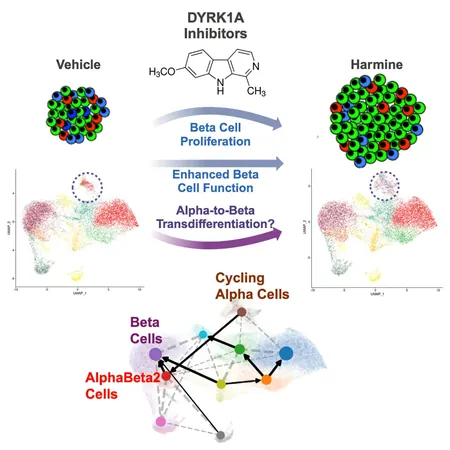
Revolutionary Vagus Nerve Stimulation Offers Hope for Severe Depression Sufferers
2024-12-18
Author: John Tan
Introduction
Recent research has unveiled promising results for individuals grappling with severe, treatment-resistant depression through the implementation of vagus nerve stimulation therapy.
Study Overview
According to a national clinical trial spearheaded by the Washington University School of Medicine in St. Louis, nearly 500 participants demonstrated noteworthy improvements in depressive symptoms, quality of life, and daily functioning after just one year of therapy.
Participants and Methodology
This extensive study, part of the ongoing RECOVER trial, involved 493 individuals across 84 sites in the United States - all of whom had endured debilitating depression that had resisted conventional treatment methods.
Alarmingly, three-quarters of these participants were so severely affected that they were unable to maintain employment.
Each participant received an implant for stimulating the left vagus nerve – a vital communication pathway between the brain and the body’s internal organs.
Interestingly, only half of the implanted devices were activated during the trial, allowing researchers to draw comparisons between active and inactive treatments.
Statements from the Research Team
Dr. Charles R. Conway, the primary investigator of the RECOVER trial, emphasized the dire situation faced by many participants: “On average, each patient had already attempted 13 ineffective treatments before joining the trial, enduring many years of debilitating symptoms. Despite this chronic illness, we’re seeing significant, measured improvements in their conditions.”
Impact of Improvements
The enhancements reported by participants could represent life-altering changes, transforming their ability to engage in day-to-day activities.
With severe depression often rendering individuals incapacitated, the improvement could mean the difference between merely existing and actively contributing to their families and communities.
Historical Context of Vagus Nerve Stimulation
Vagus nerve stimulation itself isn't new; this therapeutic device received FDA approval nearly two decades ago for treating treatment-resistant depression but hasn’t gained widespread adoption.
This hesitance can be attributed to factors such as the high costs involved and lack of insurance coverage, as the Centers for Medicare and Medicaid Services (CMS) and many private insurance providers do not currently reimburse the procedure.
Future Implications of the Trial
However, the RECOVER trial carries significant implications for the future of treatment coverage.
Designed to provide CMS with necessary data, the ongoing study evaluates the long-term effectiveness of vagus nerve stimulation for those struggling with both depression and bipolar disorder.
A shift in CMS policy based on trial outcomes could potentially broaden the accessibility of this innovative therapy.
Mechanism of Treatment
The treatment involves a pacemaker-like device implanted beneath the skin in the chest, with a wire that connects to the vagus nerve in the neck.
The device provides consistent stimulation to the nerve, which influences brain regions linked to mood regulation.
Over the course of the study, subjects with activated devices experienced markedly improved symptom relief compared to those with inactive devices.
Study Methodology and Progress Tracking
The initial phases of the year-long trial focused on calibrating the devices to meet the individual needs of each patient, with evaluations commencing three months into the study.
Participants' progress was tracked using various validated assessment tools, offering comprehensive insights into their mental health journey.
Timing of Benefits
Remarkably, most of the observed benefits manifested in the final three months of treatment - a finding consistent with previous research indicating that the positive effects of vagus nerve stimulation generally evolve slowly.
As the study drew to a close, those with inactive devices were allowed to turn them on, leading researchers to anticipate even greater long-term benefits.
Long-term Monitoring
Participants in the trial will continue to be monitored for an additional four years to assess the durability of their improvements and identify specific patient characteristics that might enhance responsiveness to the treatment.
Conclusion
The implications of these findings are indeed profound, with Dr. Conway noting the importance of patient-reported improvements, especially for individuals who have undergone numerous failed treatments.
"Patients are expressing meaningful enhancements in their everyday functioning," he noted. "Vagus nerve stimulation therapy has been supported by previous studies to yield lasting positive effects, fostering hope for those who have often felt abandoned by traditional treatment options."
As research progresses, the future looks increasingly bright for those dealing with severe depression. Stay tuned for updates on this groundbreaking therapy that may soon redefine mental health treatment across the nation!


 Brasil (PT)
Brasil (PT)
 Canada (EN)
Canada (EN)
 Chile (ES)
Chile (ES)
 España (ES)
España (ES)
 France (FR)
France (FR)
 Hong Kong (EN)
Hong Kong (EN)
 Italia (IT)
Italia (IT)
 日本 (JA)
日本 (JA)
 Magyarország (HU)
Magyarország (HU)
 Norge (NO)
Norge (NO)
 Polska (PL)
Polska (PL)
 Schweiz (DE)
Schweiz (DE)
 Singapore (EN)
Singapore (EN)
 Sverige (SV)
Sverige (SV)
 Suomi (FI)
Suomi (FI)
 Türkiye (TR)
Türkiye (TR)